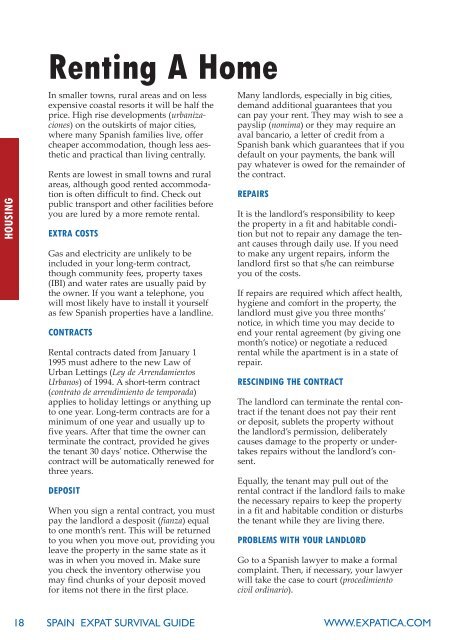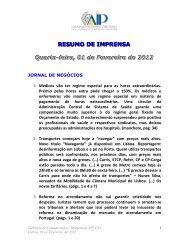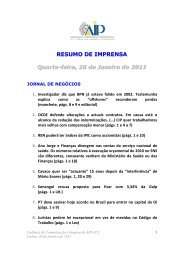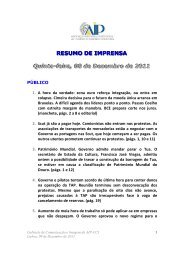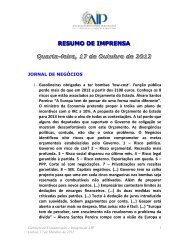front cover.qxd 09/02/2005 14:26 Page 1 - AIP
front cover.qxd 09/02/2005 14:26 Page 1 - AIP
front cover.qxd 09/02/2005 14:26 Page 1 - AIP
Create successful ePaper yourself
Turn your PDF publications into a flip-book with our unique Google optimized e-Paper software.
es-housing.<strong>qxd</strong> <strong>09</strong>/<strong>02</strong>/<strong>2005</strong> 11:04 <strong>Page</strong> 18<br />
HOUSING<br />
18<br />
Renting A Home<br />
In smaller towns, rural areas and on less<br />
expensive coastal resorts it will be half the<br />
price. High rise developments (urbanizaciones)<br />
on the outskirts of major cities,<br />
where many Spanish families live, offer<br />
cheaper accommodation, though less aesthetic<br />
and practical than living centrally.<br />
Rents are lowest in small towns and rural<br />
areas, although good rented accommodation<br />
is often difficult to find. Check out<br />
public transport and other facilities before<br />
you are lured by a more remote rental.<br />
EXTRA COSTS<br />
Gas and electricity are unlikely to be<br />
included in your long-term contract,<br />
though community fees, property taxes<br />
(IBI) and water rates are usually paid by<br />
the owner. If you want a telephone, you<br />
will most likely have to install it yourself<br />
as few Spanish properties have a landline.<br />
CONTRACTS<br />
Rental contracts dated from January 1<br />
1995 must adhere to the new Law of<br />
Urban Lettings (Ley de Arrendamientos<br />
Urbanos) of 1994. A short-term contract<br />
(contrato de arrendimiento de temporada)<br />
applies to holiday lettings or anything up<br />
to one year. Long-term contracts are for a<br />
minimum of one year and usually up to<br />
five years. After that time the owner can<br />
terminate the contract, provided he gives<br />
the tenant 30 days' notice. Otherwise the<br />
contract will be automatically renewed for<br />
three years.<br />
DEPOSIT<br />
When you sign a rental contract, you must<br />
pay the landlord a desposit (fianza) equal<br />
to one month’s rent. This will be returned<br />
to you when you move out, providing you<br />
leave the property in the same state as it<br />
was in when you moved in. Make sure<br />
you check the inventory otherwise you<br />
may find chunks of your deposit moved<br />
for items not there in the first place.<br />
Many landlords, especially in big cities,<br />
demand additional guarantees that you<br />
can pay your rent. They may wish to see a<br />
payslip (nomima) or they may require an<br />
aval bancario, a letter of credit from a<br />
Spanish bank which guarantees that if you<br />
default on your payments, the bank will<br />
pay whatever is owed for the remainder of<br />
the contract.<br />
REPAIRS<br />
It is the landlord’s responsibility to keep<br />
the property in a fit and habitable condition<br />
but not to repair any damage the tenant<br />
causes through daily use. If you need<br />
to make any urgent repairs, inform the<br />
landlord first so that s/he can reimburse<br />
you of the costs.<br />
If repairs are required which affect health,<br />
hygiene and comfort in the property, the<br />
landlord must give you three months’<br />
notice, in which time you may decide to<br />
end your rental agreement (by giving one<br />
month’s notice) or negotiate a reduced<br />
rental while the apartment is in a state of<br />
repair.<br />
RESCINDING THE CONTRACT<br />
The landlord can terminate the rental contract<br />
if the tenant does not pay their rent<br />
or deposit, sublets the property without<br />
the landlord’s permission, deliberately<br />
causes damage to the property or undertakes<br />
repairs without the landlord’s consent.<br />
Equally, the tenant may pull out of the<br />
rental contract if the landlord fails to make<br />
the necessary repairs to keep the property<br />
in a fit and habitable condition or disturbs<br />
the tenant while they are living there.<br />
PROBLEMS WITH YOUR LANDLORD<br />
Go to a Spanish lawyer to make a formal<br />
complaint. Then, if necessary, your lawyer<br />
will take the case to court (procedimiento<br />
civil ordinario).<br />
SPAIN EXPAT SURVIVAL GUIDE WWW.EXPATICA.COM


